SUMMARY
This is AI generated summarization, which may have errors. For context, always refer to the full article.
![[VANTAGE POINT] Opposition to port system project mounts: Will Marcos take heed?](https://www.rappler.com/tachyon/2023/07/TL-tempest-port-redux-July-19-2023.jpg)
Consider this: 90% of what we see around us has been carried by ships, with roughly 68% as import volumes and 22% going to our respective dining tables. Now, what would happen if how we received these goods were altered? The country would tailspin to a catastrophic, irreversible economic downturn.
No wonder then that Industry stakeholders – alarmed by reports that Malacañang is considering the implementation of Philippine Ports Authority (PPA) Administrative Order 04-2021 (PPA AO 04-2021) and the Trusted Operator Program-Container Registry and Monitoring System (TOP-CRMS) – are painting a dark scenario if this “novel” idea is shoved down their throats. TOP-CRMS aims to digitalize processes presumably to make port operations efficient and prevent port congestion.
Just to remind you: local blockchain-based logistics joint venture company Shiptek Solutions Corp., NextIX, Inc., and the Aboitiz-owned Union Bank of the Philippines won the P900-million procurement contract for TOP-CRMS and the Empty Container Storage Shared Service Facility. The contract’s implementation had been indefinitely deferred until recently when Malacañang called for a meeting to discuss its execution.
Would President Ferdinand R. Marcos Jr. acquiesce to the wishes of the project proponents, which include a prominent family closely associated with him as TOP-CRMS partner, or would he listen to the appeal of the industry and the consuming public who would directly bear the brunt of the after effects of AO-04-2021? This is a litmus test for the President’s year-old administration.
Marcos Jr., who publicly champions food security as one of his top-most priorities, should carefully weigh his decision. Has he been smitten by the P40,742,058,130.00 benefit the proponents are boasting the contract would contribute to the Philippine economy? I find this claimed amount questionable.
In PPA’s cost-benefit analysis (CBA) matrix which Rappler obtained, Vantage Point found several irregularities.
The PPA has considered container deposit as an expense that would be eliminated in the implementation of TOP-CRMS. It must be emphasized that container deposit from its very wording is a refundable sum of money and not a direct cost, contrary to how it is described in the matrix. I find it dubious that the alleged P23,483,857,860 can be considered as savings for the non-payment of container deposits.
In the matrix, the amount of P1.686,375,883.00 and P1,115,483,248.00 were declared as savings from the truck waiting time and truck driver salary, respectively. Marcos Jr. should ask the PPA for a justification on how it arrived at the amount, considering that these are variables which cannot be quantified or accurately measured.
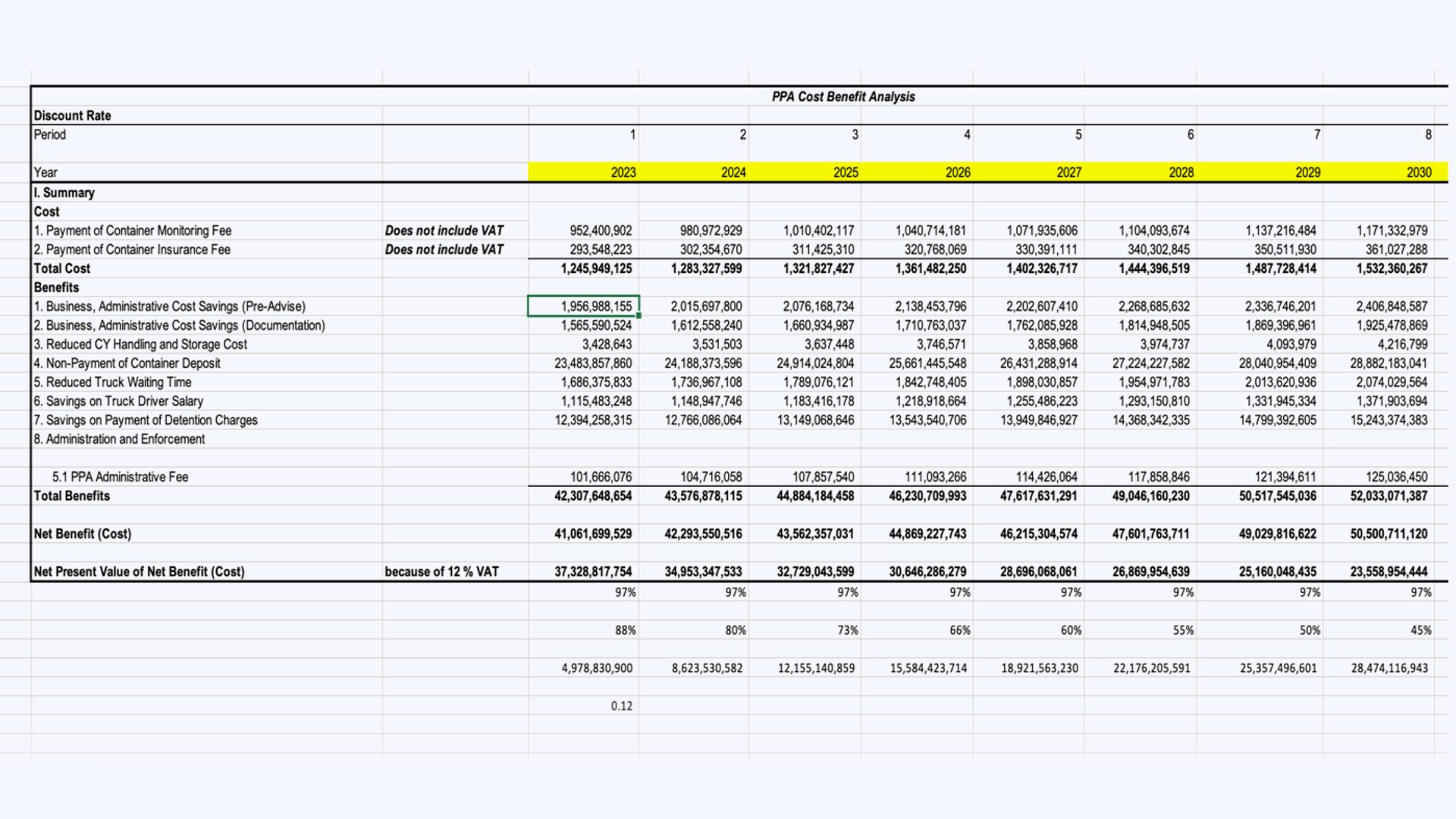
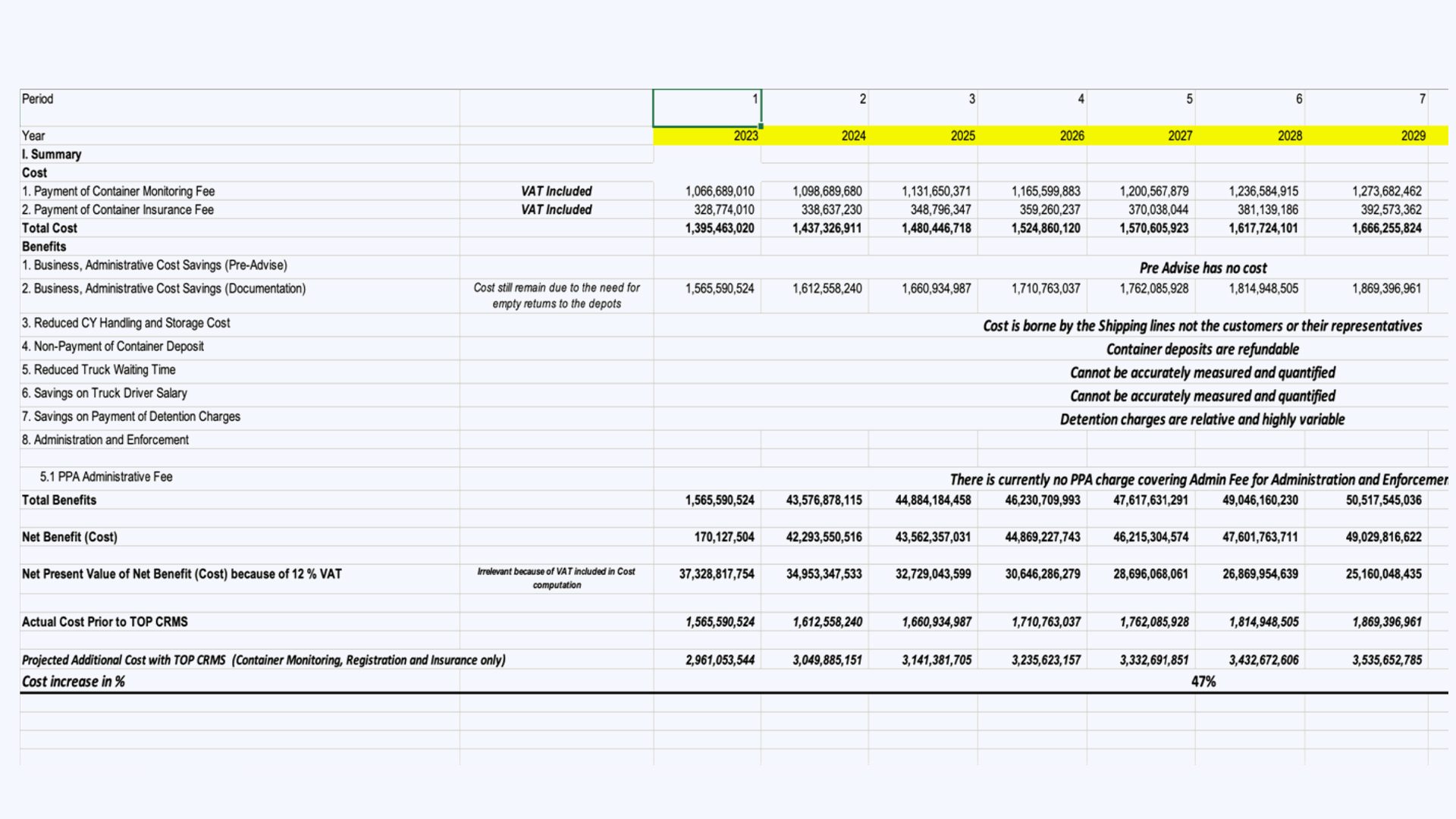
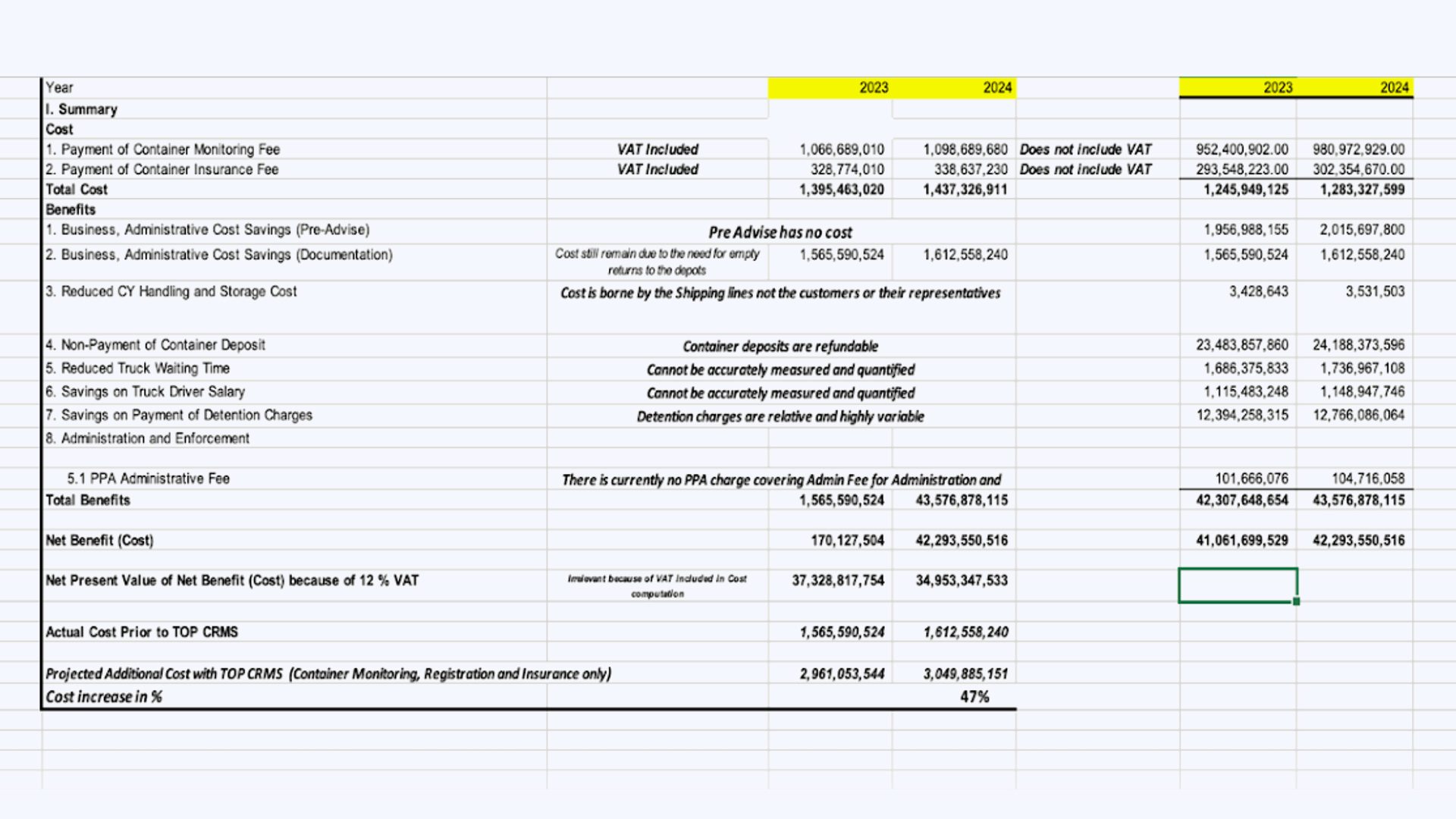
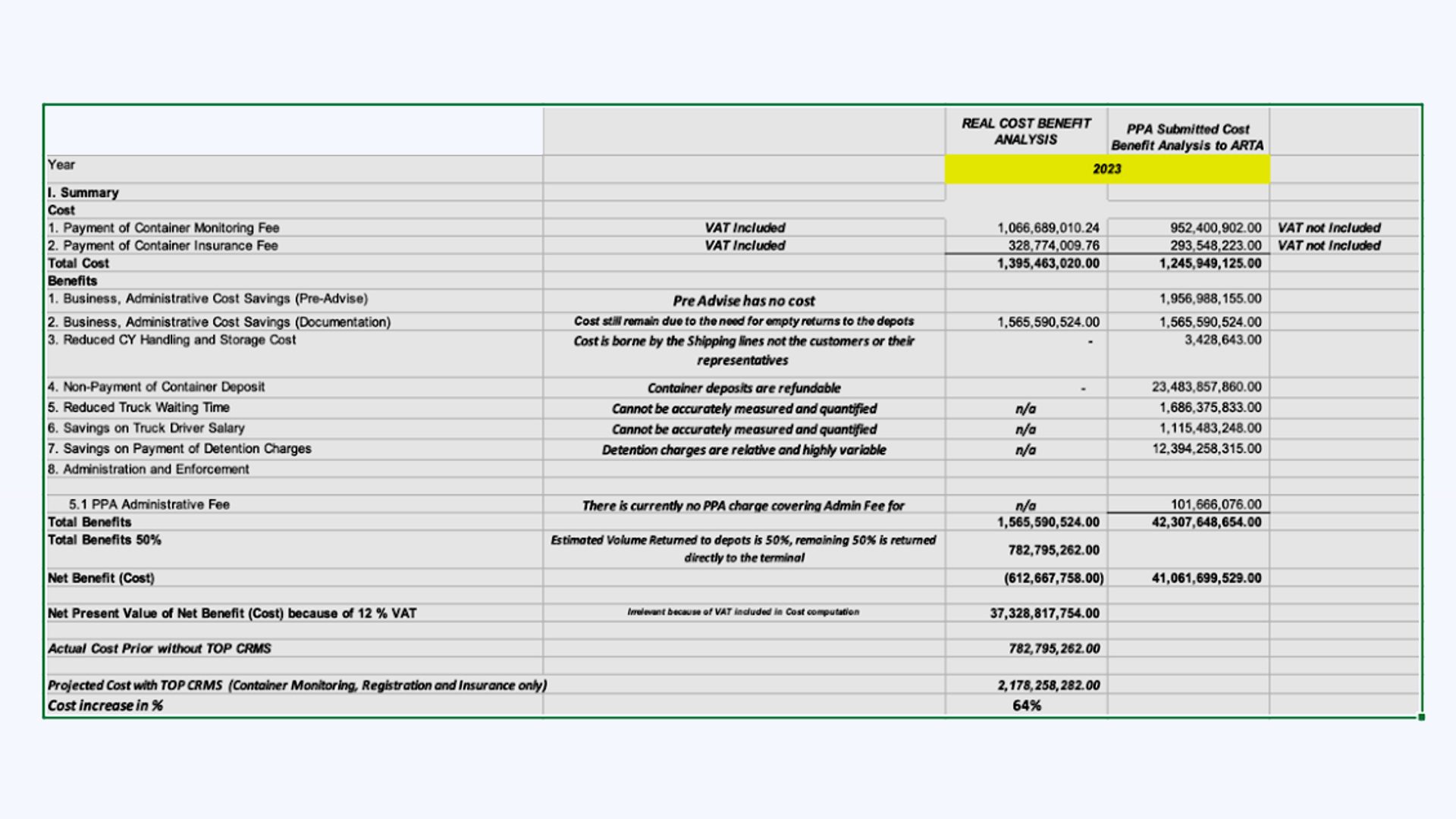
Stakeholders have emphasized that “pre-advice” has no cost, which renders the alleged P1,956,988.155.00 savings from “pre-advice” in the matrix absurd.
The justification for the P12,394,258,315.00 worth of savings from detention charges indicated in the matrix needs to be clarified, considering that detention charges are imposed only on a case-to-case basis.
At present, there is no PPA administrative fee being charged. Hence, the P101,666,076.00 amount of savings from said charge upon TOP-CRMS implementation is clearly incorrect.
Container Yard handling and storage costs are charged against the shipping lines and not to the customers. Therefore, PPA’s claim of P3,428,643.00 worth of savings is baseless.
A stakeholder consulted by Rappler about these numbers concludes: “The so-called P40,742,058,130.00 is a substantial amount which cannot be ignored. It is a vital number which may either be a savings or an expense which would directly affect the purchasing power of consumers.”
On January 10, around 14 industry associations and organizations issued a joint manifesto titled “United Call to Revoke PPA Administrative Order No. 04-2021,” citing the policy’s potential negative impact on port operations and the economy, and claiming that it has no legal basis and contradicts ease of doing business and trade facilitation.
Opposition mounts
Now, I am told that more stakeholders, economic managers, business groups, transport associations, and concerned members of the international community have joined the call for the order’s revocation.
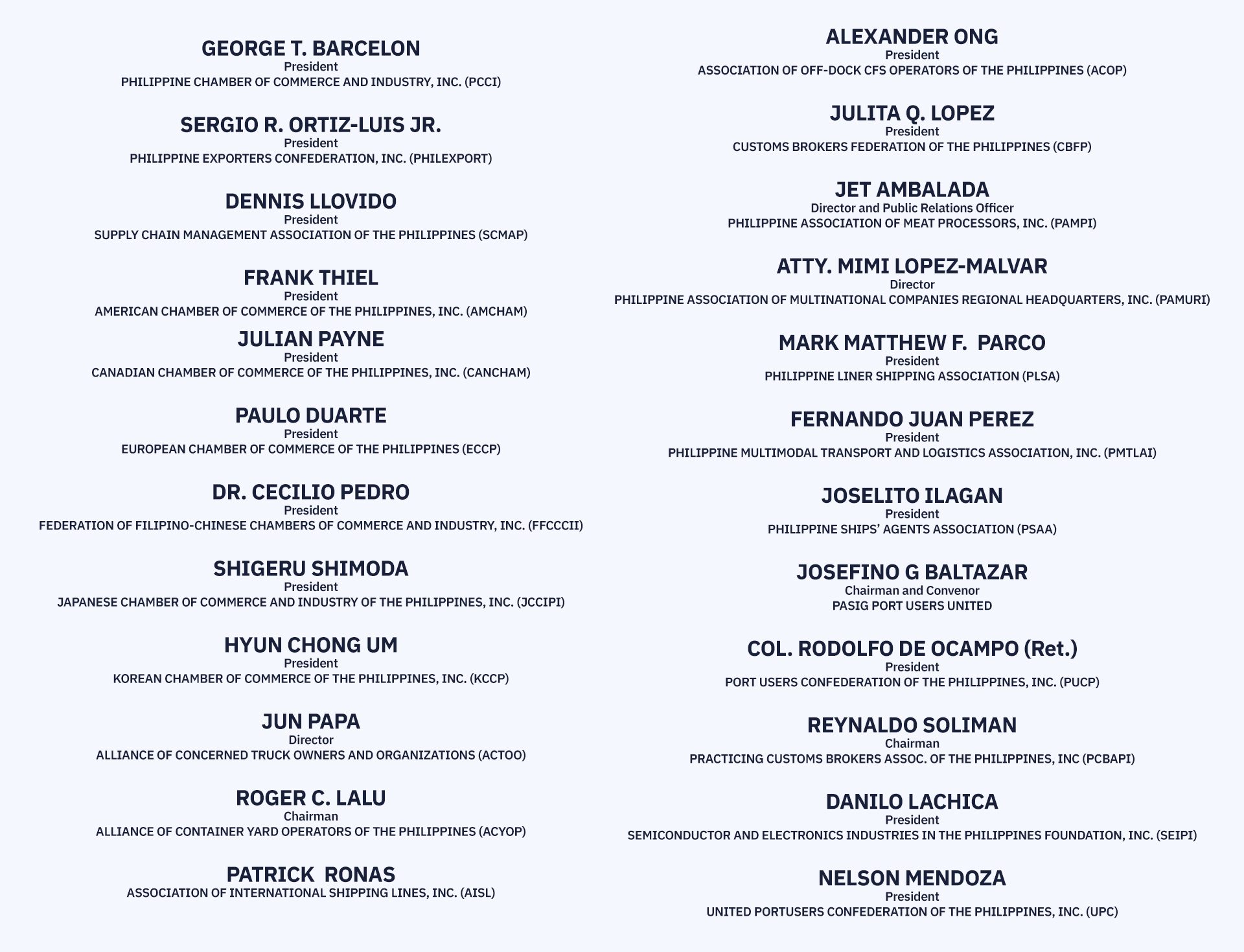
Among the issues they are raising are:
- The probability of an increase in the cost of importing goods by at least Php35 billion per year, or as much as 50%, due to additional direct financial costs from higher insurance fees, transaction fees, and trucking fees;
- There already exists digital container tracking and booking applications of international shipping lines, terminal/off-dock CY operators, so the implementation of PPA’s proposed container monitoring system would be an additional layer of bureaucracy that would not benefit, but merely burden, the public.
- Precious public funds would just be wasted with the PPA AO 04-2021’s digitalization scheme because the Bureau of Customs has an ongoing World Bank-supported digitalization and modernization strategy that aims to curb smuggling.
- Any action to be undertaken by the PPA regarding the issue of container deposits would be outside its jurisdiction and preempt the efforts of the country’s legislative branch where the Technical Working Group of the House Committee on Transportation is currently deliberating on House Bill No. 04933, a.k.a. the “International Maritime Trade Competitiveness Act,” and that of their Senate counterpart where Senate Bill No, 2147 is pending.
Clearly from my vantage point, the increase in logistics cost will be paid for ultimately by the consumers. The incremental cost will be added to the retail price of goods. Will Marcos Jr. show the statesmanship and resolve needed to avert an eventual crisis that could arise from a faulty system branded by its proponents as a “solution” to port problems? – Rappler.com
Val A. Villanueva is a veteran business journalist. He was a former business editor of the Philippine Star and the Gokongwei-owned Manila Times. For comments, suggestions email him at mvala.v@gmail.com.
Add a comment
How does this make you feel?
![[Vantage Point] Tempest at the ports (Part 1)](https://www.rappler.com/tachyon/2022/11/Philippines-Dependence-on-Foreign-Trade-and-Investments-Imports.jpg?fit=449%2C449)
![[Vantage Point] Tempest at the ports (Part 2)](https://www.rappler.com/tachyon/2023/02/tempest-ports-part-2-february-4-2023.jpg?fit=449%2C449)

![[ANALYSIS] Aboitiz Power Corporation beats expectations](https://www.rappler.com/tachyon/2023/11/ABOITIZ-beats-expectations-copy.jpg?resize=257%2C257&crop_strategy=attention)
![[ANALYSIS] Listing status of Metro Pacific and Aboitiz Power as we enter October](https://www.rappler.com/tachyon/2023/09/tl-october-stock-speculation.jpg?resize=257%2C257&crop_strategy=attention)
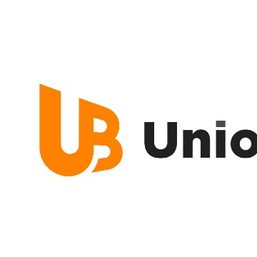


![[ANALYSIS] Challenges affecting the cold chain industry](https://www.rappler.com/tachyon/2024/05/tl-cold-chain-industry-challenges.jpg?resize=257%2C257&crop_strategy=attention)
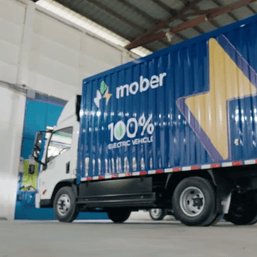
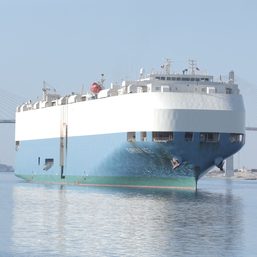
There are no comments yet. Add your comment to start the conversation.